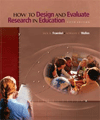

 How to Design and Evaluate Research in Education, 5/e Variables and Hypotheses True/False |
 2003 McGraw-Hill Higher Education
2003 McGraw-Hill Higher EducationAny use is subject to the Terms of Use and Privacy Policy.
McGraw-Hill Higher Education is one of the many fine businesses of The McGraw-Hill Companies.